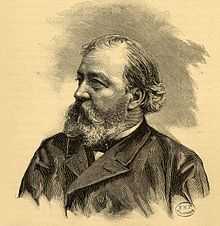Désiré-Magloire Bourneville

Désiré-Magloire Bourneville (October 20, 1840 – May 28, 1909) was a French neurologist born in Garencières.
He studied medicine in Paris, and worked as interne des hôpitaux at the Salpêtrière, Bicêtre, Hôpital Saint-Louis and the Pitié. During the Franco-Prussian War, he served as both a surgeon and an assistant medical officer. From 1879 to 1905 he was a physician of pediatric services at Bicêtre. In Paris, he founded a day school for special instruction of mentally retarded and epileptic children.
In 1866, during a severe cholera epidemic in Amiens, he volunteered his services, and after the siege had passed, was presented with a gold watch as an expression of the city's gratitude. During the Paris Commune (1871), when revolutionaries wanted to execute their wounded enemies, Bourneville intervened and saved the prisoners' lives.
During the 1870s, he became a member of the French Parliament (1873) and the Paris city council (1876). In both positions he advocated reforms of the health system.
In 1880, he provided an early description of a multi-symptom disorder that was to become known as "Bourneville's syndrome", now known as tuberous sclerosis. This genetic condition may lead to mental retardation, epilepsy, a disfiguring facial rash and benign tumors in the brain, heart, kidney and other organs. The condition was also studied by the British dermatologist, John James Pringle (1855-1922), leading some historical texts to refer to it as "Bourneville-Pringle disease".
Writings
- Études du thermométrie clinique dans l'hémorrhagie cérébrale. (doctoral thesis).
- Sclérose tubéreuse des circonvolution cérébrales: Idiotie et épilepsie hemiplégique. Archives de neurologie, Paris, 1880, 1:81-9l.
- Encéphalite ou sclérose tubéreuse des circonvolutions cérébrales. Archives de neurologie, Paris, 1881, 1: 390-412.[1]
- Iconographie photographique de la Salpêtrière. Service de M. Charcot. (with Paul-Marie-Léon Regnard 1850-1927). three volumes, Paris 1876-1880.
- Assistance, traitement et éducation des enfants idiots et dégénérés. Paris, 1895.[2]
See also
References
- Ole Daniel, Enersen. "Désiré-Magloire Bourneville". Who Named It?. Retrieved 2007-01-23.
- ↑ Bourneville-Pringle disease @ Who Named It
- ↑ Bibliography of Bourneville @ Who Named It
|